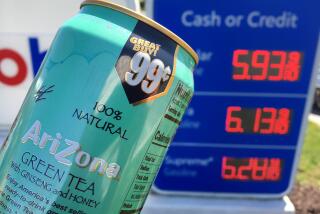Adrian Grenier’s Churchkey Can Co. beer is now in L.A.
- Share via
Just in time for the theatrical premiere of HBO’s “Entourage” comes a brand of beer launched by its star. Adrian Grenier’s Churchkey Can Co. is now offering their unique craft pilsner in Los Angeles, and the most notable aspect of the brand is not the celebrity founder but the throwback packaging that requires more work than your typical pop-top.
From wide-mouth cans to “vortex bottles,” how a beer is packaged is often more of a selling point than the quality of the beer itself. After all, while telling the difference between Bud Light, Miller Lite and Coors Light by flavor alone is exceedingly difficult, brands need some way to draw customers to their productions. Recently brands like Coors and Miller have found success using throw-back designs in their bottles and cans.
Craft beer, while usually sold on basis of substance over style, has occasionally also used packaging techniques to stand out. Branding that evokes simpler times is utilized by popular craft breweries like Modern Times and House Beer, but no craft brand has taken the idea as far as Churchkey Can Co. This brand, based in Portland, Ore., forgoes modern conveniences for the once ubiquitous flat-top-style cans that require the tool for which the company is named to open.
In 2011 former Nike designer Justin Hawkins and “Entourage” star Adrian Grenier were carousing in Portland when they got to talking about the beautiful designs featured on American beer cans during the middle part of the 20th century, and the forgotten struggle it could be to open these steel vessels.
They assumed some brewery had already tried to market throw-back cans, but when they couldn’t find any modern examples, they decided to create Churchkey Can Co. to bring back the outmoded packaging.
The brand first launched in the Pacific Northwest using steel cans manufactured by the beverage packaging veterans at the Ball Corp. and beer brewed at Washington’s Two Beers Brewing Co. with a recipe designed by Portland homebrewers Lucas Jones and Sean Burke.
Hawkins says he was inspired by the work ethic and DIY spirit of his homebrewing neighbors, and that the idea of savoring the rewards of hard work defines Churchkey beer. “It’s worth the effort” is the slogan for the brand, and Hawkins says, “of course it takes more effort to open the can, but it’s also a lot of effort to make the beer — to get it right.”
The steel cans proved to be a quality control challenge, and Churchkey eventually pulled their product from the market when it wasn’t up to their standards. Production of the brew moved to Cold Spring Brewing Co. — a Minnesota contract brewery that also handled production for 21st Amendment Brewing and many other craft brands.
The cans were redesigned as traditional 12-ounce aluminum cans with a tab-less flattop, and Churchkey Can Co. is now sending their pilsner throughout the West Coast. Six packs are available in L.A.-area retailers such as Total Wine and More stores and independent bottle shops such as Downtown’s Buzz Wine Beer Shop.
The story of a designer and an actor teaming up to launch a beer brand is novel, and the packaging is certainly striking and unique, but the real question should of course be “how does the beer taste?”
We had the chance to try it ourselves at the L.A. launch party — fittingly held at Hollywood’s Grandpa Johnson’s bar — and we were pleasantly surprised. Designed to be approachable, drinkable, evocative of an idealized America lost to history, Churchkey Pilsner is remarkably solid, with a subtle noble hop zing and a clean malt character.
While it’s tough to enjoy the subtle aroma through the triangular notch cut into the can’s lid by the included churchkey opener, the brew’s medium body and balanced bitterness make it fine sessionable option for backyard BBQs and pool parties.
Let’s put it this way, while the lager won’t stand up to the best of the craft pilsners (Firestone Walker’s sublime Pivo PIls or local favorite Little Bo Pils from Smog City Brewing, for instance), Churchkey’s Pilsner-style brew is worth trying — despite the kitschy packaging and starry pedigree, not because of it.
More to Read
Eat your way across L.A.
Get our weekly Tasting Notes newsletter for reviews, news and more.
You may occasionally receive promotional content from the Los Angeles Times.










